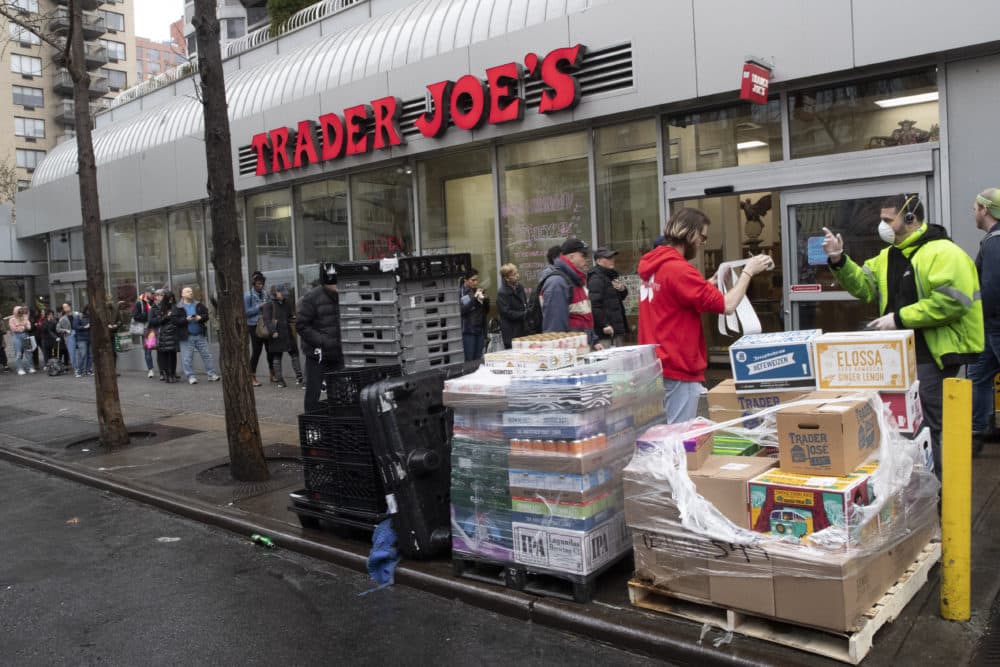Advertisement
Despite 'Panic Shopping' At Grocery Stores, Experts Say Don't Worry About U.S. Food Supply

At its 17 stores around the region, the grocery chain Roche Bros. said demand was up nearly three times since Thursday following a rush of news that pointed to an impending coronavirus outbreak in the U.S.
The spike in shopping has sparked fears that food supply chains will struggle to meet a sustained increase in demand.
“The situation is tough right now,” said Arthur Ackles, vice president of merchandising and buying at Roche Brothers. “Over the past seven or eight days, our customers have been coming into the stores at a pretty alarming rate.”
Ackles said last Thursday and Friday saw a roughly 10% increase in foot traffic, while this Thursday and Friday the increase skyrocketed to between 200% and 300%.
While paper and hygienic products have been in short supply for days, only recently have customers started clearing shelves of food products, Ackles said.
“We’re still getting [food] in, fortunately," he added, "but at the pace that it's going, if it keeps up like this for a few more days, those areas are going to get sparse as well."
Fears over the virus have set off what some experts described as "panic shopping." The phenomenon, they said, has been fueled by images of long lines and empty shelves that led more people to rush to the grocery store.
But some observers of supply chains said consumers don't need to panic about long-term shortages.
Yossi Sheffi, director of MIT's Center for Transportation Logistics, said the current run on grocery stores is like what happens before a snowstorm — only worse. People fear the unknown, he said, and they're preparing for what could be weeks, even months, of uncertainty.
Advertisement
Sheffi attributed much of the fear to shortcomings in national political leadership. But he said the strong food system in the U.S. can make up for the political shortcomings.
“I don't think this will be a long-term issue,” he said. “People get their pantries full ... and the United States food supply chain is pretty robust."
But a report out this week from the management consultancy Bain & Company indicated supply chains across markets could face tough times. In light of the experience of China’s retail sector during the worst of the outbreak there, the report said supply chains were a "huge challenge" for companies, with slowdowns in production and distribution.
According to the report, the coronavirus will play out for retailers in three phases:
- Phase 1. The virus is present but has not yet infected many people. While day-to-day life is mostly normal, consumers are beginning to stock up on essentials and cut discretionary spending. ...
- Phase 2. The virus has become prevalent in the market (or in markets where supplies originate), with governments taking restrictive actions (such as quarantines or closing schools and public places) that result in labor shortages and considerable disruption to supply and demand. ...
- Phase 3. Recovery and beyond—the situation progressively returns to (a new) normal. Competitive positions and customer relationships may have been significantly altered.”
Ackles said there's one step to ease some of the pressure on suppliers: suspend limitations on how many hours truck drivers can work. That's a move that may be controversial.
“The supply chain is getting worse by the second,” he said Friday evening.
Ackles said he's expecting that 50% of the product he ordered earlier that day will not arrive on time.
“I know our company and other competitors are ravaged right now," he said, "and there’s not going to be a lot of product available for people to get [over the weekend]."
He added, "I’ve never seen any snowstorm like this.”
This segment aired on March 14, 2020.

